Discovering Lebanese Flavors in Dubai's Dining Scene
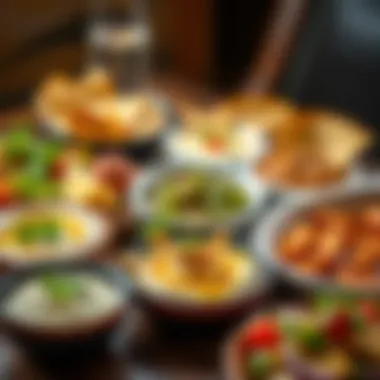
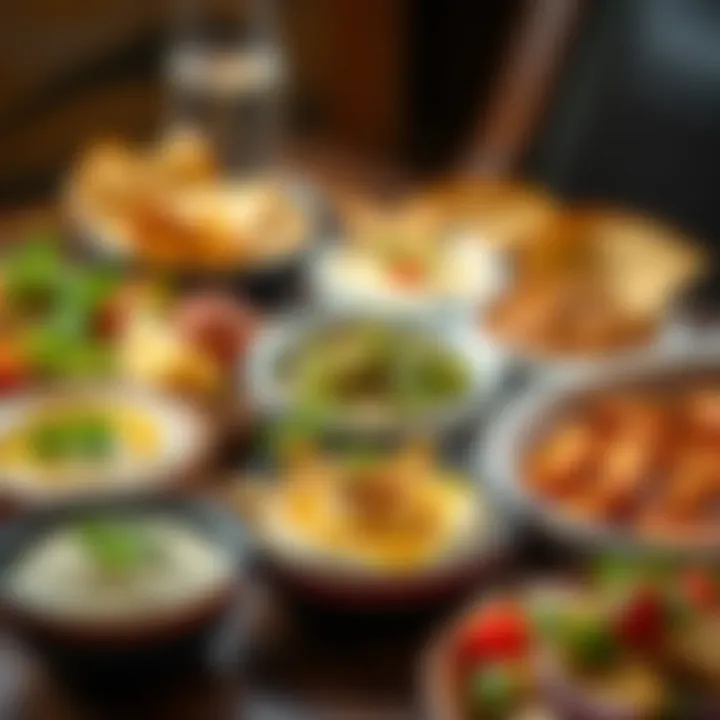
Intro
Lebanese cuisine, in all its glory, presents a delicious blend of tradition and modernity, deeply influenced by regional cultures and practices. When it lands in a bustling metropolis like Dubai, the flavors become even more enriched, reflected in a myriad of dining options available across the city.
Dubai's restaurant scene serves as a microcosm of its multicultural society, where the heritage of Lebanese culinary delights coexists with global influences. Indeed, eating in Dubai can feel like a culinary world tour that brings local and exotic flavors right to your plate.
The Lebanese restaurants in Dubai are noteworthy not just for their mouth-watering dishes but also for the overall dining experience they offer. From informal eateries teeming with locals to glorious fine dining establishments showcasing culinary artistry, these venues encapsulate the heart of Lebanese culture. They are places where traditional recipes are lovingly adhered to, yet there is also an undeniable adaptation to contemporary tastes that characterizes modern Dubai.
In this article, we take a deep dive into Lebanese cuisine, exploring its representation in Dubai. We will investigate popular dishes that grace the menus, delve into unique dining experiences, and examine the cultural significance of these culinary traditions within the city's vibrant atmosphere.
By exploring how Lebanese restaurants seamlessly blend authenticity with modern preferences, the narrative unfolds a showcase of gastronomic artistry that appeals to both residents and visitors. As we navigate through this journey, you will gain insights into the rich flavors, cultural depths, and the lively nature of Lebanese dining that Dubai proudly serves on many plates.
Prologue to Lebanese Cuisine
Lebanese cuisine stands out as a vibrant reflection of the country's history, diversity, and cultural richness. This article aims to shed light on the unique flavors and culinary traditions that define Lebanese food, especially within the bustling restaurant scene of Dubai. As we explore the essence of this cuisine, it's clear that understanding its roots and significance is essential for both food enthusiasts and investors in the local dining market.
Historical Background
Lebanon's geographical position along the eastern Mediterranean has fostered a fusion of cultures over millennia. Ancient Phoenician practices, combined with influences from Ottoman, French, and various regional traditions, have shaped Lebanese culinary art into what it is today. The rich tapestries woven through centuries tell stories of migration, trade, and the intermingling of different peoples—a reflection found in its food.
For instance, during the Ottoman Empire, which lasted until the early 20th century, various cooking techniques and spices were introduced. The French mandate added a touch of finesse to the culinary scene, leading to the evolution of dishes like pâté and croissants, which have made their way into Lebanese food culture. Overall, the historical context provides depth to the flavors found in Dubai's Lebanese restaurants, where dishes often carry snippets of the past.
Core Ingredients
At the heart of Lebanese cuisine are a few key ingredients that make every dish memorable. Unlike some cuisines that rely heavily on a single flavor profile, Lebanese cooking balances fresh produce with herbs, spices, and grains. The primary elements include:
- Olive oil: Central to most dishes, it adds distinct flavor and richness.
- Garlic and lemon juice: These are indispensable, bringing brightness and zest, particularly in salads and marinades.
- Legumes and grains: Chickpeas and lentils form the backbone of staples like falafel and lentil soup.
- Herbs: Parsley and mint infuse freshness, making salads like tabbouleh shine.
- Spices: Sumac, cinnamon, and allspice create a flavor complexity, enabling the diverse palette of dishes typical in Lebanese kitchens.
An understanding of these core ingredients is critical for both restaurateurs and investors seeking to capitalize on the trend of authentic Lebanese dining in Dubai's marketplace.
Cultural Significance
Lebanese food transcends the mere act of eating; it's a vital part of the culture that emphasizes community, hospitality, and celebration. Sharing a meal often serves as a bridge between generations, allowing stories and traditions to flow alongside the dishes prepared. The act of serving mezze—a variety of small dishes that promote sharing—embodies this cultural practice.
Moreover, Lebanese cuisine is steeped in symbolism. Many dishes celebrate seasonal produce or religious events, creating a richer connection to the food. For example, during Ramadan, families gather to break their fast with specific dishes, enhancing the spirit of togetherness and gratitude.
As Dubai continues to evolve into a gastronomic hub, the inclusion of Lebanese restaurants enriches the multicultural fabric of the city's food scene. Understanding these cultural nuances can provide an edge for anyone looking to venture into this area.
The Culinary Landscape of Dubai
Dubai is more than just a city; it’s a melting pot of cultures, each bringing their unique flavors to the table. The culinary landscape of this vibrant metropolis reflects its diverse population, making it an exciting destination for food lovers. In this context, Lebanese cuisine holds a special place and enhances the overall gastronomic experience.
Diverse Food Scene
A stroll through the heart of Dubai’s food scene reveals an astonishing variety of culinary offerings. From high-end gourmet establishments to bustling street food, the choices are nearly limitless. Local delicacies sit side by side with international cuisines, and this diversity doesn’t just cater to the expatriate community; it’s a symphony of flavors that resonates with every palate.
This diverse food scene means that Lebanese restaurants aren’t just one of many; they’re a crucial ingredient in Dubai’s culinary tapestry. As people from various backgrounds come together, Lebanese food acts as a bridge, introducing intricate flavors and shared culinary experiences. This is where family recipes meet modern dining trends, creating a delightful fusion.
"Dubai’s food landscape is like a patchwork quilt, each dish adds its own color and texture, and Lebanese cuisine is a vibrant patch that cannot be overlooked."
The Role of Lebanese Restaurants
Lebanese restaurants play a significant role in shaping Dubai’s food culture. They not only serve food but also preserve and promote a rich culinary heritage. Restaurant owners often take pride in their roots, infusing traditional recipes with a touch of modernity, appealing to both nostalgic tastes and adventurous eaters.
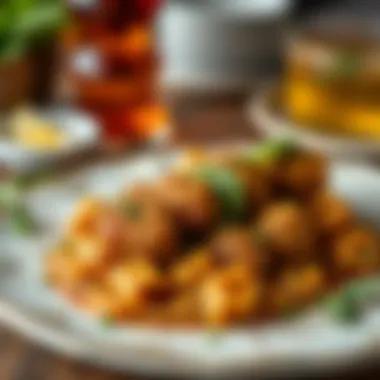
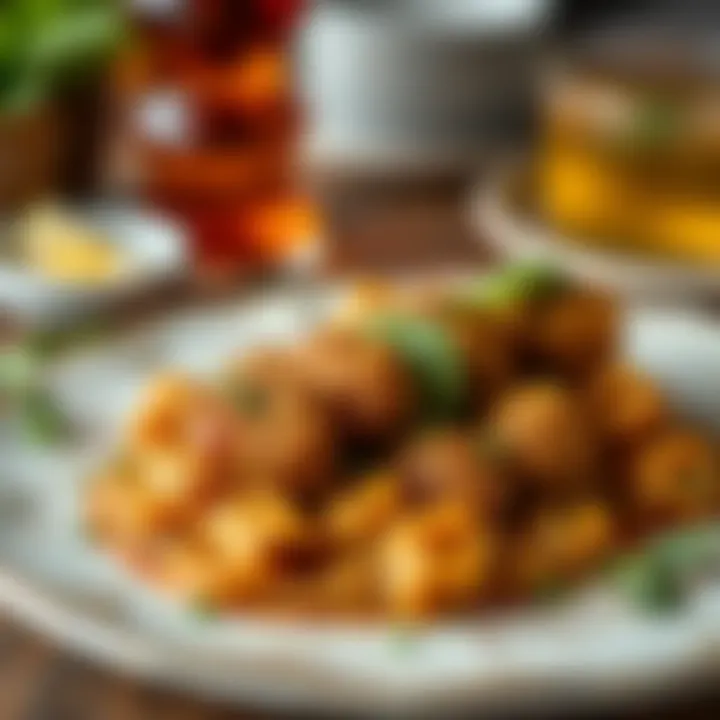
Moreover, Lebanese dining experiences are tailored to encourage social interactions. Mezzes, for instance, are designed for sharing, turning meals into gatherings filled with conversations and laughter. This communal spirit embodies Lebanese hospitality and is central to the dining experience here in Dubai.
Another essential aspect is the emphasis on fresh, high-quality ingredients. Many Lebanese restaurants highlight local produce and sustainable practices, which resonates well with the growing trend towards health-conscious dining. This commitment to quality further solidifies the reputation of Lebanese eateries as not only a delicious choice but also a responsible one.
In summary, the culinary landscape of Dubai thrives on its eclectic mix, and Lebanese restaurants are pivotal to this dynamic ecosystem. They embody an intersection of tradition and modern tastes, reflecting the essence of a city that celebrates diversity through its food.
Signature Dishes of Lebanese Cuisine
Signature dishes serve as the heart and soul of Lebanese cuisine; they are a reflection of the heritage, flavors, and traditions that have evolved over centuries. In Dubai's restaurant scene, these dishes not only allow diners to savor authentic Lebanese flavors but also offer them a glimpse into the rich tapestry of Lebanese culture. Each dish tells a story, often passed down through generations, and reveals the local customs and communal practices around food preparation and consumption.
When discussing Lebanese gastronomy, the term "mezze" inevitably surfaces. It encompasses an array of small dishes served as appetizers, allowing for shared experiences among diners. With a strong social component, mezze embodies the spirit of hospitality inherent in Lebanese culture, making it a vital culinary experience for both locals and expatriates in Dubai. Moreover, the diversity in flavors and textures among the signature dishes ensures that there is something for everyone, making them a popular choice for gatherings and celebrations.
Mezze: An Preamble
Mezze is more than just a course; it's a Lebanese tradition that compels people to gather around the table. Typically enjoyed before the main meal, mezze consists of various dishes that could include dips, salads, and finger foods. This style of dining promotes sharing and conviviality, paving the way for deep conversations and connections between diners. In the buzzing environment of Dubai, where people from different backgrounds converge, mezze becomes a unifying culinary thread. It invites everyone to partake and experience flavors that resonate culturally across borders.
Famous Dishes
Tabbouleh
Tabbouleh is a quintessential Lebanese salad known for its vibrant freshness and rich nutritional profile. Primarily made of finely chopped parsley, tomatoes, and bulgur wheat, it's dressed with olive oil and lemon juice, which infuse it with a zesty flavor. What makes tabbouleh particularly compelling is its key characteristic: the prominence of parsley, elevating it beyond being merely a side dish to a standout feature on Lebanese tables. In the context of Dubai, this dish has gained immense popularity among health-conscious diners due to its wholesome ingredients and refreshing taste. The balance of flavors and textures in tabbouleh—crunchy, refreshing, and tangy—makes it an ideal option for those looking to engage with authentic Lebanese cuisine.
Hummus
Hummus is perhaps one of the most recognized components of Lebanese cuisine globally. This creamy dip blends chickpeas, tahini, lemon, and garlic into a velvety texture that soothes the palate. The beauty of hummus lies in its versatility; it can be enjoyed with pita bread, vegetables, or even used as a spread. For Dubai's bustling foodie scene, hummus encapsulates the essence of comfort food while also catering to contemporary dietary needs, including veganism and vegetarianism. Its widespread appeal among diverse populations further solidifies its place as a staple dish that resonates beyond Lebanese borders, contributing significantly to the culinary identity of the city.
Kibbeh
Kibbeh presents a more complex representation of Lebanese flavors. This dish comes in various forms—such as fried, baked, or served raw—and typically consists of finely ground meat mixed with spices and bulgur wheat. Each preparation method highlights a different aspect of kibbeh, showcasing both the culinary skills involved and the cultural significance tied to its recipes. As a dish that often needs careful craftsmanship, kibbeh appeals to those seeking a deeper connection with Lebanese culinary traditions. Its hearty flavor and texture, particularly when paired with fresh herbs or sauces, make it a popular choice in Dubai’s Lebanese restaurants.
Grilled Meats
Grilled meats occupy a special space in Lebanese cuisine, characterized by intense flavors and aromatic spices. Dishes like shish tawook (grilled chicken skewers), kafta (minced meat skewers), and lamb chops showcase the depth of marination and culinary expertise. The grilling process imparts a smoky flavor that beautifully complements the spices used. Grilled meats are not only a highlight of the menu but also a reflection of the gathering culture in Lebanese dining. In Dubai, where outdoor shisha cafes and restaurants thrive, grilled meats gain appreciation for their ability to tantalize both locals and tourists alike. The rich, smoky flavors wrapped in fragrant spices offer an immersive experience that few dishes can replicate.
Beverages and Desserts
While the savory dishes steal the spotlight, Lebanese cuisine also boasts an array of delightful beverages and desserts.
Mint Lemonade
Mint lemonade is a refreshing drink beloved for its invigorating taste. It combines fresh mint leaves, lemon juice, sugar, and water, resulting in a zesty, cooling beverage ideal for Dubai’s warm climate. This drink not only quenches thirst but also enhances the dining experience by providing a palate cleanser amidst richer flavors. Mint lemonade invites many to try a touch of Lebanese hospitality, offering a refreshing break before diving back into the medley of flavors found in the cuisine.
Knafeh
When it comes to desserts, knafeh holds a special place in Lebanese hearts. This dish features layers of gooey cheese encased in a crispy pastry shell, drizzled with sweet syrup. The unique combination of textures and the sweetness of the syrup represent a celebration of indulgence, making knafeh a go-to dessert for many occasions. For diners in Dubai, experiencing knafeh becomes almost a rite of passage, and its rich flavors merge beautifully with the lavish surroundings often found in Lebanese restaurants.
Baklava
Baklava has gained international fame for its incredible layers of flaky pastry, nuts, and syrup. In the context of Lebanese cuisine, it's a dessert that embodies richness and joy. The critical aspect of baklava lies in its preparation; it requires patience and precision to create the delicate layers that culminate in a heavenly bite. It stands out in Dubai's vibrant food scene, where the sweet treat is often chosen to complement the usual coffee served after meals. Diners gravitate toward baklava not just for its taste but for the experience it evokes—a comforting nod to rich cultural traditions.
The Dining Experience in Lebanese Restaurants
The dining experience in Lebanese restaurants encapsulates more than just a meal; it is an immersion into a culture rich with history, flavor, and hospitality. In Dubai's vibrant culinary scene, where the competition is fierce, Lebanese restaurants stand out for their ability to provide not only exquisite food but also an experience that resonates with the essence of Lebanese traditions.


Ambiance and Decor
When one steps into a Lebanese restaurant in Dubai, they are often greeted by an inviting atmosphere that transcends the everyday dining scene. Warm colors, intricate mosaics, and traditional artifacts create a backdrop that reflects Lebanese heritage. The decor often incorporates elements that tell a story—pictures of Lebanon’s landscapes, calligraphy, and handcrafted items bring the spirit of the country to life.
Certain establishments, like Al Nafoorah, aim to replicate the embrace of a Lebanese home. Elegant lighting casts a soft glow, while the layout encourages communal dining, a vital part of Lebanese culture. Families and friends gather around table laden with mezze, embodying the famed Lebanese hospitality that feels more like a gathering than just a meal. The ambiance thus serves a crucial purpose, enhancing the dining experience by fostering connections and encouraging shared moments over food.
Service Standards
In Lebanese restaurants, service is often a reflection of the culture's values of generosity and personal connection. Attentive waitstaff offer recommendations tailored to individual tastes without being intrusive. This level of service sets expectations high—a diner might not only expect warmth but also a willingness to share the stories behind the dishes.
For instance, a server at Karam Beirut might not just take your order but also share anecdotes about the origins of certain dishes, making the meal even more meaningful. Such a personalized approach can transform a simple order into a culinary journey, creating a lasting impression on guests. This blend of expertise and genuine hospitality characterizes the Lebanese service philosophy, making diners feel valued and appreciated.
Culinary Events and Promotions
Culinary events and promotions are pivotal in enhancing the dining experience in Lebanese restaurants throughout Dubai. These establishments often host themed nights, cooking classes, or wine pairing events, encouraging diners to engage with the cuisine more deeply.
For example, during Ramadan, you'll find special iftar menus that not only showcase traditional dishes but also highlight the spirit of togetherness and generosity characteristic of Lebanese culture. Another initiative seen at places like Em Sherif is the organization of cooking classes, where guests can learn to prepare classic dishes like tabbouleh and kibbeh under the guidance of seasoned chefs.
Such experiences not only elevate the dining scene but also forge a stronger connection between the cuisine and the diner, making Lebanese food more than just a meal—it becomes a shared journey and a celebration of culture.
The true essence of Lebanese dining lies in its ability to create connections—through food, service, and atmosphere, each element harmonizes to offer an experience that is both authentic and inviting.
Notable Lebanese Restaurants in Dubai
The quest for authentic Lebanese cuisine in Dubai leads to an exciting discovery of various restaurants that reflect the country’s culinary excellence. This section focuses on notable establishments, each embodying the essence of Lebanese culture through food. Exploring these restaurants provides insights into their unique offerings, the atmosphere they create, and the value they bring to Dubai's food scene.
High-End Dining
Al Nafoorah
At the heart of luxury dining, Al Nafoorah stands out as one of Dubai's premier Lebanese restaurants. Nestled within the iconic Jumeirah Emirates Towers, this venue presents a lavish setting that harmonizes tradition with modernity. The allure of Al Nafoorah is not merely in its opulent decor, but also in its culinary artistry.
Key Characteristic: The restaurant offers an extensive menu that highlights authentic Lebanese flavors while embracing seasonal ingredients. Its standout feature is the wood-fired oven, enhancing the taste of their baked goods, especially the famed manakish. This characteristic adds a flavorful twist, making it more than just another dining experience.
Unique Feature: Al Nafoorah's terrace offers stunning views of the Dubai skyline, making it ideal for evening dining. The ambiance, paired with soft live music, cultivates a sophisticated yet relaxed setting.
Despite its high-end positioning, Al Nafoorah caters to discerning palates keen on both traditional recipes and innovative dishes. This fusion preserves the roots of Lebanese cuisine while appealing to contemporary tastes. While it does come with a higher price tag, the quality and presentation justify the cost, providing diners a memorable culinary journey.
Em Sherif
Em Sherif is a name synonymous with fine Lebanese dining in Dubai. Situated along the bustling beach road of Jumeirah, it effortlessly combines rich heritage with an upscale atmosphere. Em Sherif has garnered acclaim for its commitment to authenticity and quality.
Key Characteristic: The restaurant prides itself on its completely homemade dishes. From the freshly baked bread to handcrafted desserts, each item is a testament to the integrity of Lebanese cooking. The highlight here is the mezzes, a delightful array of small dishes that allows guests to sample a variety of flavors, from tangy to savory.
Unique Feature: One of the most captivating aspects of Em Sherif is the decor. With elegant Arabic-inspired designs and an inviting ambiance, it creates a feeling of being in the heart of Beirut. The service is another strong point, often noted for being attentive without being intrusive.
While the prices are on the higher side, the experience at Em Sherif is well worth it for those looking to indulge in an authentic Lebanese feast in a luxurious setting. This restaurant stands as a beacon of cultural celebration while welcoming a diverse clientele, cementing its place on Dubai's culinary map.
Casual Dining Options
Zaatar W Zeit
For those seeking a more laid-back experience, Zaatar W Zeit offers a fresh take on Lebanese cuisine in a casual setting. This popular eatery is known for its modern interpretation of traditional dishes, making it a beloved go-to for locals and visitors alike.
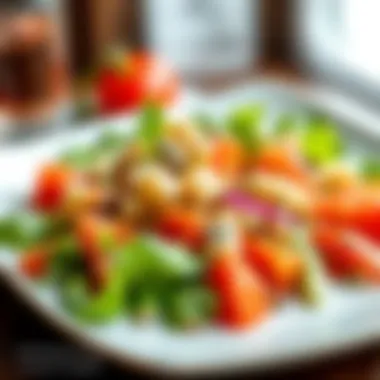
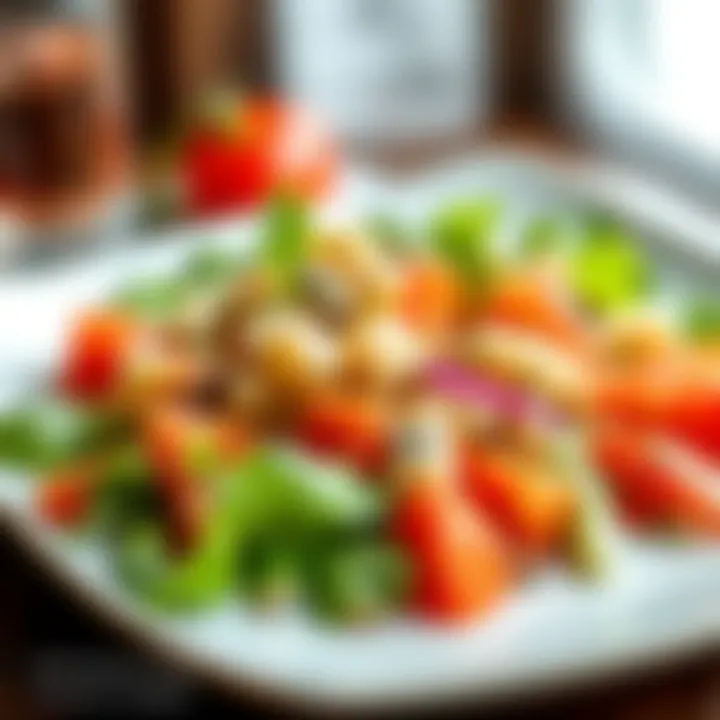
Key Characteristic: The eatery features a menu filled with freshly made wraps, pizzas, and salads, all inspired by Lebanese flavors. One of their signature offerings is the Zaatar wrap, combining fresh herbs with a touch of garlic and olive oil, encapsulating the essence of Lebanese cuisine in a convenient form.
Unique Feature: Its vibrant atmosphere is complemented by an open kitchen concept, allowing patrons to see their food being prepared. This not only enhances transparency but adds to the comfort level of diners.
Zaatar W Zeit serves as a bridge for those who might be new to Lebanese food. With an affordable price point and quick service, it provides an excellent entry into this rich culinary tradition, satisfying the cravings of both casual diners and families.
Karam Beirut
Karam Beirut is another gem in Dubai’s casual dining landscape. Famed for its warm hospitality and homely environment, it has captured the hearts of many with its authentic dishes that remind diners of a true Lebanese home.
Key Characteristic: The menu offers a variety of mezzes and hearty main dishes, focusing heavily on traditional flavors. Their kebabs and fatoush salad are crowd favorites that have drawn praise for their authenticity and taste.
Unique Feature: Karam Beirut’s atmosphere is casual but elegant, making it suitable for both family outings and a quick meal with friends. The restaurant often hosts open mic nights and cultural events, encouraging a sense of community and connection through food.
With reasonably priced menus that don't compromise on quality, Karam Beirut stands as a staple for those looking to experience the heart of Lebanese culture. It balances tradition with a welcoming environment, reinforcing the communal aspect of dining.
In the bustling metropolis of Dubai, these notable Lebanese restaurants serve as not just places to eat but as cultural havens, showcasing the depth and diversity of Lebanese cuisine.
The Impact of Lebanese Cuisine on Dubai's Food Culture
Lebanon’s culinary craftsmanship has made significant waves in Dubai, shaping the city's diverse food culture in unmistakable ways. The marriage of tradition and modernity in Lebanese dishes enriches not just dining options but also promotes a deeper appreciation for multiculturalism in this vibrant metropolis. The bustling streets and upscale dining venues offer a canvas where Lebanese flavors blend harmoniously with various international cuisines, showcasing the city’s unique character. Understanding this impact provides insight into how Lebanese cuisine stands as a vital contributor to Dubai’s gastronomic landscape.
Culinary Fusion
In Dubai, culinary fusion often takes center stage, with Lebanese cuisine occupying a prime spot on this mosaic. The cross-pollination of flavors is not merely an accident; it reflects the city's demographic mosaic, bringing people together through food. For instance, dishes like shawarma have been interpreted with a local twist that might include spicy sauces inspired by South Asian flavors, while still respecting the authentic essence of the original recipe.
- Creativity in dishes: A Lebanese chef may incorporate saffron into risotto, offering a Middle-Eastern flair to an Italian classic, showcasing how culinary boundaries can easily fade.
- Global influences: Restaurants that marry traditional Lebanese fare with elements from Turkish, Persian, or Indian cuisines amplify this fusion. For example, a concept may feature mutabbal, a smoky eggplant dip, served alongside naan bread—a familiar embrace that speaks to diverse palates.
This culinary blend fosters an atmosphere of innovation, where chefs are not afraid to step outside the traditional lines while keeping core Lebanese flavors intact.
Celebrating Culinary Heritage
The preservation of Lebanese culinary heritage is not just about the food itself; it embodies values, stories, and the history of a people. In Dubai, Lebanese restaurants often celebrate this heritage, showcasing the staples that have stood the test of time. The art of making tabbouleh or the intricate methods of preparing kibbeh provide authenticity that connects people to their roots, even when they are streets away from home.
Lebanese cuisine teaches not only about flavors but also about the customs surrounding them. Family gatherings often feature dishes that have been passed down through generations, fostering a sense of continuity and community. Moreover, the act of sharing mezze—a selection of small dishes—further encourages kinship:
- Family Style: The tradition of sharing food reminds us that dining isn't just about nutrition but also about togetherness.
- Cultural festivals: Events celebrating Lebanese heritage in Dubai often feature food stalls, cooking classes, and tastings that portray the country’s culinary past and future.
In essence, Lebanese cuisine in Dubai serves as both a bridge and a beacon. As it continues to flourish and evolve, it not only maintains the roots of its traditions but also paves the way for new, exciting culinary dialogues.
"Food is a universal language, a shared experience; Lebanese cuisine, in Dubai, tells a story of heritage while embracing the future."
This impact of Lebanese cuisine goes beyond the plate, shaping interactions and experiences among investors, homebuyers, and property managers, making it an essential aspect of Dubai's rich and complex food culture.
The End
Emphasizing the impact of Lebanese cuisine in Dubai's vibrant gastronomic landscape, this conclusion cultivates an understanding of its invaluable role in bridging cultures and flavors. The fusion of traditional recipes with modern culinary flair showcases not only the adaptability of Lebanese food but also its deep-rooted significance in the city. The ongoing culinary exchange reflects a commitment to preserving heritage while embracing innovation, ensuring a multifaceted dining experience for patrons from various backgrounds.
Reflecting on the Journey
The journey through Lebanese cuisine in Dubai is rich with stories and flavors. Reflecting on this gastronomic adventure offers insights into how dishes have evolved, influenced by the different cultures coexisting in the city. From the soulful warmth of a family-run eatery to the sophistication of upscale dining, each restaurant adds a unique chapter to the narrative. Patrons can savore the rich tapestry woven through each plate served, revealing generations of culinary wisdom. The dedication to maintaining authenticity while appealing to modern tastes has allowed Lebanese food to thrive here. As diners partake in cultural exchanges over a plate of kibbeh or a glass of mint lemonade, they become part of a larger story—the shared history of Lebanese people and their diasporas.
Future of Lebanese Dining in Dubai
The prospects for Lebanese dining in Dubai appear bright and promising. Trends suggest a rising interest in health-conscious options that align with global dining tendencies. The traditional ingredient palette, with its emphasis on fresh herbs, vegetables, and lean proteins, positions Lebanese cuisine well within this health-conscious shift. Furthermore, the emergence of pop-ups and food trucks specializing in Lebanese street food introduces a casual but authentic dining experience that can appeal to younger generations. As Dubai continues to be a melting pot of cultures, Lebanese cuisine stands poised to influence and shape the culinary narrative even further.
“The blend of tradition and innovation sets Lebanese cuisine apart, making it a cultural ambassador in Dubai.”
Investors and food enthusiasts alike will benefit from tracking these trends, as they signal potential growth opportunities in the restaurant sector. With Lebanese food expanding its reach beyond traditional boundaries, the future looks bright, ensuring that each bite tells a story, bridging the past with new culinary horizons.













